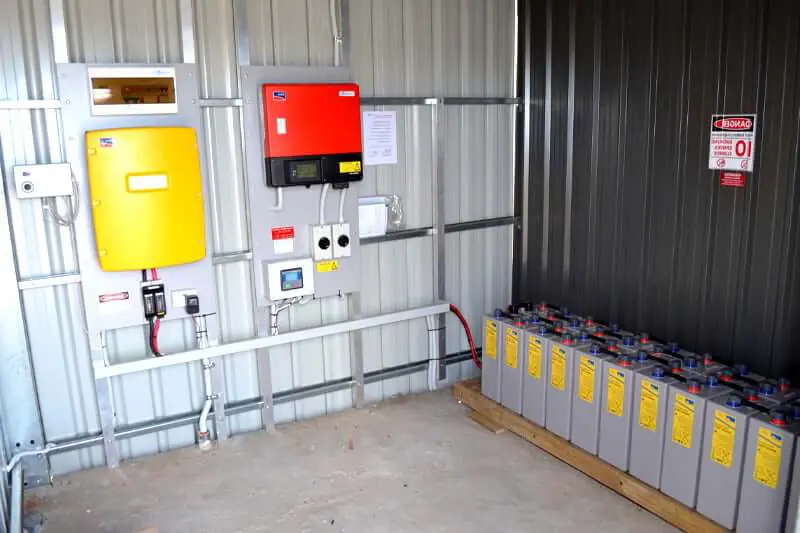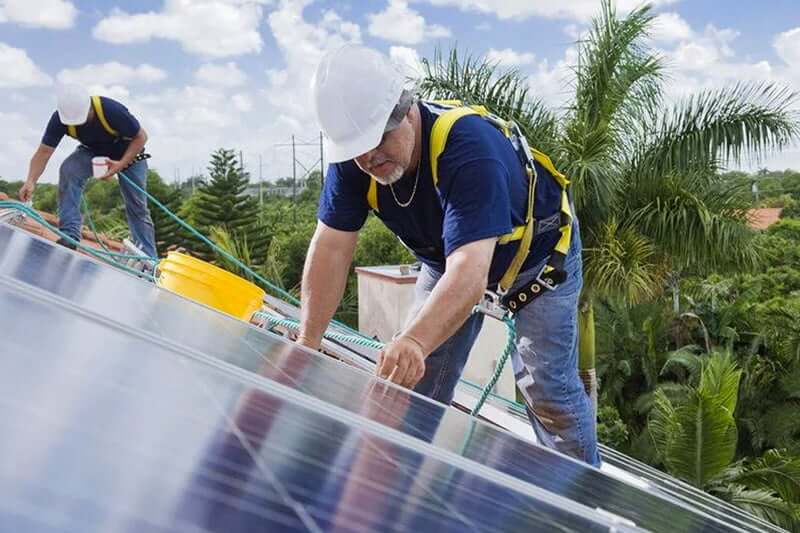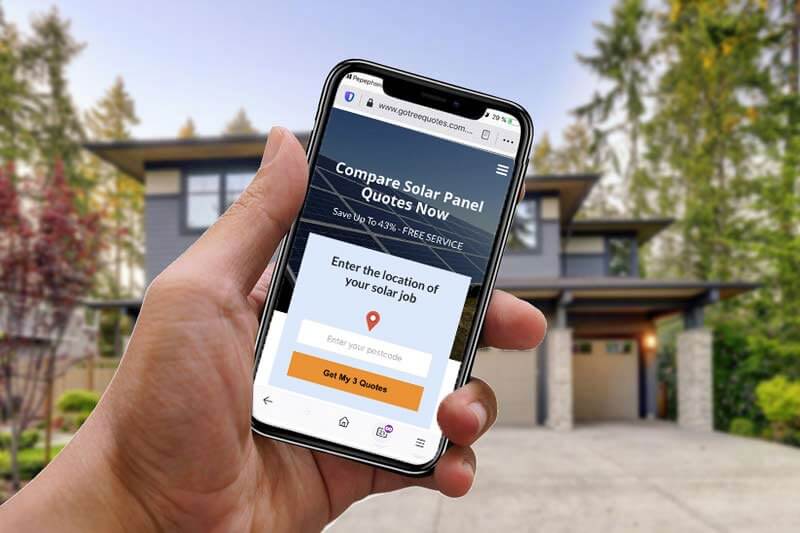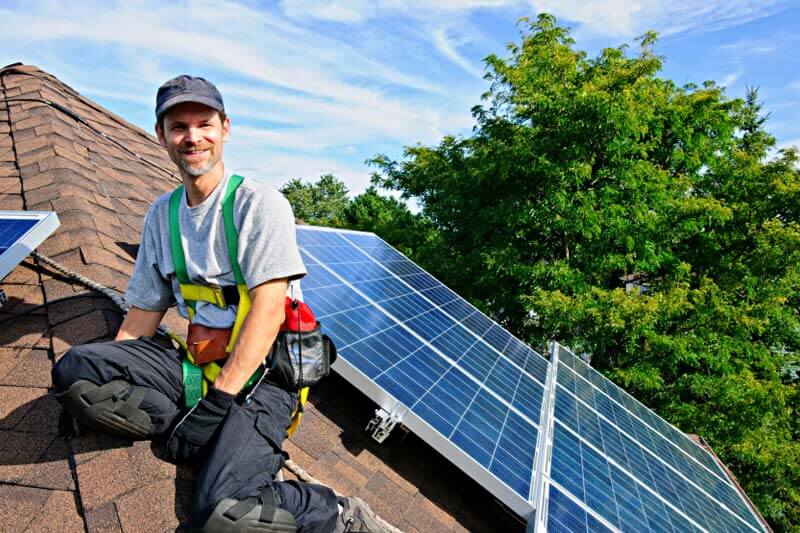Home Solar Battery Storage Off-Grid Solar Battery Storage
Off-Grid Solar Battery Storage
If you live on a farm or way out in the bush where connecting to the primary power grid isn’t an option, it’s likely that you’ll need a bigger battery setup or a petrol generator for backup.
Because solar batteries are still super expensive, you are best to only have one large enough to satisfy your power needs for 24 hours. Anything more would be overkill, especially if you still plan to live in suburbia.
The bad thing about solar batteries is they are still way too expensive for the average joe. The ROI on solar systems is negated when a battery is added.
Your cost jumps from $5,250 on average (no battery) to $17,490) on average (with battery).
Table of Contents
ToggleHow Many Batteries Do I Need To Go Off-Grid?
If you get a 6kWh solar system with a battery (by far the most popular size), then you will need 14-18kWh of battery storage.
A 6kWh solar system produces about 24kW in an entire day. Most of which is generated between 10:00 and 14:00.
Because all power is generated throughout the day, we use on average 70% of that power at night, we need a way of storing the energy to use later.
You can either use a battery, or net metering/ feed-in tariffs to send the excess power to the grid for credit and draw on it again at night.
Still Living in Suburbia
If you are still living in the suburbs, but just like the idea of using a battery to store your excess power, it’s worth mentioning the cost of your solar system will be 3 x.
- Grid-tied 6kW solar system (no battery) – $5,240
- Off-grid 6kW solar system (with battery) – $17,490
With a grid-tied system you will reduce your power bill by 90% or thereabouts. THe solar system will pay for itself in 3 – 4 years.
With an off-grid system, you will save 100% off your power bill, but the system will take 9 – 12 years to pay for itself.
In my view, it’s not worth paying an extra $12,500 upfront cost to save $50 per month.
Going Bush
If you have no other option but to go off-grid, I would recommend getting one or two batteries as a backup and buying a gasoline generator just in case. A backup to your backup.
You could buy 4 or 5 batteries to be 100% safe, but on the very rare occasion you will need to dip into those batteries, it’s probably not worth the extra outlay.
Advantages of Going Off-Grid
No Need for Utility Infrastructure
The obvious advantage is being self-sufficient and not needing to rely on the power infrastructure being installed when you buy a property.
Reduced Energy Costs
Going off-grid completely means you will not pay a cent to energy companies which can be very satisfying. The upfront costs are greater, but most states have great incentives in the form of rebates and interest-free loans to help anything looking to buy battery storage to go with their solar system.
Avoid Power Outages
Black-outs tend to happen a lot more in rural areas, as the authorities normally take longer to respond. Residents can go days without power. Having a backup means security, especially if you rely on it to heat or cool your home. It can be a lifesaver.
Become Energy Self-Sufficient
This is the dream for anyone who runs a small farm or considers themselves environmentally friendly. Once you take the next step and buy an electric car, you can say goodbye to paying for gasoline and electricity.
Disadvantages of going off-grid
Cost
The initial outlay for the battery component when going off-grid is massive. A typical 6kWh solar system will cost about $5,240
Advantages of Staying Grid-Tied
Negate the Cost of Batteries
On average you will pay $12,500 for a solar battery big enough to last you one day. If you live in a state with generous battery rebates, you will still pay about $10,000. We all love money, so if you don’t have a lot of it, just getting a solar system and opting for net metering is a far cheaper option.
ROI Pays Back Faster
The payback period of a regular grid-tied 6kWh solar system is 3 – 4 years. Add a battery and that will stretch out to 9 – 12 years.
Bearing in mind a battery needs to be replaced every 10 years, it never really pays for itself, as when it does, you need to buy another one anyway.
Is It Worth Going Off-Grid?
This will depend on your motives. If one of the above advantages appeals to you or you are in a situation where you don’t have much of a choice, then it´s great to have the option.
In my personal opinion, it is best to wait a few years for the price of batteries to come down before getting them installed. If you can remain grid-tied, using the grid as a virtual battery is your best bet.
Hybrid Solar Systems (Best of Both Worlds)
This is what we have suggested above. Have a battery backup, but also a grid connection just in case you have an issue or some poor weather and you need some commercial power.
How Much Does Battery Storage Cost
| Battery Brand | Cost | Battery Size (kWh) | Cost Per kWh |
|---|---|---|---|
| Smile5-INV | $9,084 | 13.6 | $668 |
| Tesla Powerwall 2 | $12,500 | 14.0 | $892 |
| Zen Hybrid Storage System | $10,000 | 10.0 | $1,000 |
| Redflow Z Cell | $12,600 | 10.0 | $1,260 |
| Solax Triple Power T-BAT H 5.8 | $6,600 | 4.0 | $1,650 |
| Magellan Power Hess | $10,465 | 6.5 | $1,610 |
| Enphase Energy Encharge 3 | $5,759 | 3.36 | $1,714 |
Off-grid battery storage is a major investment. How much you pay for off-grid battery storage depends on the size of the system, the amount of power produced, that needs to be stored and the brand or manufacturer.
To purchase and install an off-grid battery storage system, you will pay about $12,000-$14,000. For this price, you will get an off-grid battery storage solution for an average household.
For a larger storage system, you will need to pay more money. The larger your storage system, the more power you can store for use when there’s no sun.

Benefits Of Going Off-Grid
Energy Independence
Going off-grid means that you don’t have regular electricity bills to pay. It also means that you don’t have to export the excess power from your solar system to the grid. Most importantly, when others suffer blackouts, you have plenty of electricity in your home.
Energy independence refers to the ability to produce and consume your own power. With a solar system coupled with a solar battery system, you can become energy independent. You can enjoy free and reliable electricity every day, including on cold winter days.
Live Anywhere
Once you have gone off-grid you can live anywhere in Australia. You can build a home in the remotest place you know in the country. Yet, you will always enjoy the luxury of free electricity.
You can live in a mobile home installed with solar power and a storage battery to make your lifestyle easy and enjoyable.
Save Money
Going off-grid will save you a lot of money. In the beginning, your initial investment will be quite steep. Solar systems and solar batteries are expensive. You have to pay a large amount between $3,000-$12,000 depending on the size of the solar system you want to purchase.
Once you install the system, you will never pay a coin for your power. You can generate and enjoy free electricity. You will never have to get regular electricity bills from an electricity retailer.
Additionally, solar panels last for about thirty years. This makes them a sustainable source of power over the long term. Thus, you can recover your investment and enjoy a long life of free electricity.
Little Maintenance
Your solar system requires little to no maintenance over its lifetime. This means that once you go off-grid, you will never have to use electricity or be in the dark due to the maintenance of your solar system.
Additionally, you save money that you would pay to have your system maintained.

How Does The Solar Battery Storage System Work
First, you need to install solar panels. Solar panels once installed convert sunlight into electricity. Depending on the time of day and intensity of sunshine, your solar panels produce a large amount of power.
The amount of power produced by solar panels on a single day cannot be exhausted by house chores. The excess power is then passed onto the battery storage system.
The battery storage system consists of several batteries connected to the solar panel system. The number of batteries you use depends on how much power your system produces.
Your solar battery storage system stores the excess power from your solar system. In the evening, there is no sun or electricity produced from your solar panels. You can use the electricity stored in the batteries.
This capability to store electricity in a battery makes your system off-grid.
Can I Expand My Battery System Later
Expanding your battery system is not easy. You can buy a solar panel system and add a battery system later.
For off-grid solar battery systems, it is difficult to expand your solar battery system. When you decide to go off-grid, make sure to purchase a large enough battery system to serve your future needs and purposes.
In this way, you will never need to expand your battery system. All you can add is new solar panels to increase the amount of power produced by the solar panels and stored.
Use This Free Tool
Gosolarquotes.com. is a free tool that connects homeowners to accredited solar installers.
In Australia, only accredited solar installers are allowed to install solar power systems. For your off-grid storage system, you will need an accredited installer to install it for you.
- At the top of the page, enter your zip code.
- Then, fill the subsequent form and provide more information about your project. Your information is then sent to accredited installers near you.
- You will then receive three quotes and advice from three accredited installers. You can pick either of the three to handle the task of installing your off-grid battery storage.

Considerations Before You Go Off-Grid
Before you go off-grid, you need to assess your lifestyle.
- Can you live without grid-connected power? You may opt for a grid connection as backup for when your storage fails or go fully off-grid.
- Also, check your battery storage. Make sure that you have a large enough capacity of storage to hold at least two days of power. If the sun doesn’t rise for two days, your storage should provide sufficient power.
- Consider the cost of your off-grid battery storage system. What is more expensive than the other? How will you get the money to set up the system to enable you to go fully off-grid and how much savings will you make?
By answering these basic questions and more, you can decide whether you want to go off-grid.

Compare Solar Panel Quotes
Table of Contents
Toggle









